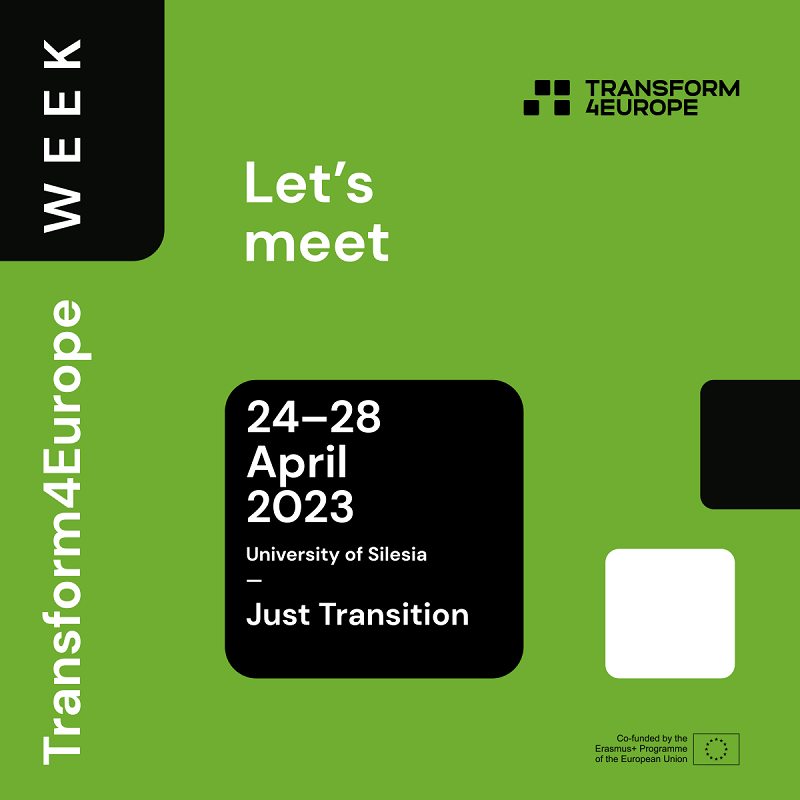T4EU Week in Katowice starts soon!
We invite students, administrative and academic staff to Poland
24–28 April 2023 | The University of Silesia in Katowice, Poland
- event for: all
- form of the event: face-to-face
- language: English
About
We invite students, administrative and academic staff of all the Transform4Europe partner universities to take part in a second edition of the Transform4Europe Week at the University of Silesia in Katowice. The topic of the event is “Just Transition”. We would like to focus on various aspects of changes that await the post-industrial regions. Undoubtedly, the challenges related to environmental protection and rapid climate change are among the most important.
- download the T4EU Week programme (PDF, 171 KB)
- download the T4EU Week programme (DOCX, 612 KB)

Didactic Stream
Within didactic stream, students can choose from five modules offered by USil (20 didactic hours). In order to obtain 3 ECTS credits for participation in didactic stream, students are also obliged to be present at the introductory lecture and to take part in Languages for lunch module.
module name
Challenges and choices of the Anthropocene epoch
Module teacher: Prof. Piotr Skubała, PhD
We live in special times, when the human population is still dynamically growing, economic growth affects more and more people around the world. Civilization changes are a source of pride and satisfaction for many. Man is transforming the surface of the Earth on an unprecedented scale. However, the price we may have to pay for constant interference in nature related to obtaining energy sources by using soil, water, forests or animals can be very high. Our pressure on the environment has become so significant that in 2000, biologist Eugene F. Stoermer and atmospheric scientist Paul J. Crutzen (1995 Nobel Prize in Chemistry) suggested that the modern geological epoch should no longer be called the Holocene, and give it the name “Anthropocene”. In their opinion, we live in a new geological age, because Homo sapiens has become a hyper-causative force of geological significance. The course will cover, among others the following issues:
- Anthropocene – the era of man.
- Planetary environmental crisis.
- Climate change as the greatest moral challenge of our time.
- A new paradigm for the development of civilization.
- On the way to the symbiocene. State of knowledge about the functioning of the Earth’s biosphere.
- On the way to the symbiocene. Laws in the natural world.
- On the way to the symbiocene. Man’s connections with nature. Man as a holobiont.
- Pandemic and biodiversity.
- People to defend nature and climate.
Assessment of social behavior. - Resolving environmental conflicts from an ethical perspective.
- Ecological and Carbon Footprint as a Lifestyle Change Tool and Business Model.
module name
Module teacher: Katarzyna Ponikowska, PhD
Cultures differ. It is determined by their philosophical and religious backgrounds, the natural environment they are fitted in, the political challenges they have to confront, etc. Sometimes we may need a clue to operate appropriately in the modern, diverse world. Therefore we will help one another and discuss how to make contact with other cultures exciting, not threatening.
module name
Module teacher: Iwona Wojtala, MA
“Everything is negotiable. Whether or not the negotiation is easy is another thing.” (Carrie Fisher) We all negotiate on a daily basis, with our family, friends, peers, bosses, colleagues, business partners, just to name a few. During the classes, students will learn how to gain an upper hand in negotiations, both in life and in business. They will study the main principles of negotiations and go through their stages to find out how to prepare for negotiations and how to conduct them. Students will also explore the differences between negotiating styles in various cultures. Within a company, negotiation skills can lead to career advancement, therefore emphasis will be put on practical skills through a number of case studies and role plays in a business setting as well as on the development of language skills in English.
Upon completion of the module students will develop their fluency in English and practise the vocabulary needed to conduct negotiations. They will become aware of the complex nature of negotiations and various negotiating styles across cultures. The module is aimed at interested students of any field of study, provided that they are at B2 level in English.
module name
Module teachers: Rafał T. Prabucki, PhD, Jakub Wyczik, MA
The course considers the legal aspects in relation to new models available through new technologies. Students perform work on a freely available solution and then, based on empirical experience, discuss the issue from the legal side. Each case study is preceded by a discussion of available legal solutions. The most related solutions to virtual worlds will be discussed: artificial intelligence systems for generating images and texts, tokenisation tools, privacy enhancement tools and other case studies related to new technologies.
module name
Administrative Stream
The agenda for the administrative stream members is scheduled for three days: 25, 26, 27th April and is addressed to staff involved in project applying and implementation processes.
Keynote speech: “Erasmus+ Capacity Build for Higher Education (CBHE) projects – application ans implementation” by the University of Alicante Project Managers: Noelia López del Castillo and Olga Bloshchinska.
Research Stream
Within research stream, participants will take part in the general discussion about the possile ways of cooperation. The program also includes a seminar about “Teaching law in augmented/digital” reality.
Cultural and Social Stream
Every participant in the T4EU Week is welcome to participate in the events complementary to their stream activities: Integration picnic, Grand Concert, and the set of sightseeing historical walks in Katowice, Chorzów and Sosnowiec.
T4EU WEEK IN 2 CITIES
Katowice
The capital of Silesian Voivodeship was established in 1865. Even though it is a relatively young city, it serves as an example of how a post-industrial city can transform into a place of innovative technology and ecological solutions.
From its very beginnings, Katowice has been strongly connected with science. One of the founders of the city was Richard Holtze, a respected physician. It is also the birthplace of the Nobel Prize winner in physics, Maria Göppert-Mayer, whose image has been immortalised on the wall of the Rectorate of the University of Silesia (ul. Bankowa 12) visible from the Rawa river.
The historic district of Nikiszowiec is a heritage of mining culture. In the branch of the Museum of Katowice History located there (ul. Rymarska 4) presented is the interior of a traditional miner’s apartment as well as a laundry room and mangle.
In the centre of Katowice, visitors are met by the iconic Spodek Arena, which first opened in 1971. The modern architecture of the city can be recognised, among others, by the design of the buildings of the Polish National Radio Symphony Orchestra (NOSPR, pl. Wojciecha Kilara 1), International Congress Centre (pl. Sławika i Antalla 1), and Silesian Museum (ul. Dobrowolskiego 1), which adapted the grounds of the former coal mine “Katowice”.
University campus
The University of Silesia occupies nearly 20 buildings, in which the Rectorate, faculties, and the Scientific Information Centre and Academic Library (CINiBA) are housed.
Did you know that…?
The Himalayan mountaineer Jerzy Kukuczka, who was the second person ever to reach the Crown of the Himalayas and Karakoram, came from Katowice.
Public transportation and the Tourist Information Centre
All the information regarding public transport and timetables is available at the Tourist Information Centre (ul. Rynek 13).
Contact:
- (+48) 322 593 808
- e-mail: katowice@silesia.travel
Cieszyn
Cieszyn is one of the oldest cities in Silesia. It received city rights at the beginning of the 13th century. From 1290 to 1918 it was the capital of the Duchy of Cieszyn.
It is located on the border of Poland and the Czech Republic. The centre of the city lies in the Polish part of Cieszyn. The Czech part of Cieszyn is called Český Těšín. The Olza river flows through the city.
There are many are many secular and sacra objects among its architectural monuments. One of the most characteristic one is the Romanesque Rotunda of Saint Nicola from the 11th century, depicted on the Polish 20 zloty banknote. The “Venice of Cieszyn”, a part of the old town located by a watercourse, enjoys immense popularity.
Cieszyn is a city closely connected with nature. 23% of the city’s area is covered with green areas, while the built-up areas remain heavily wooded. There are 3 wildlife reserves. It also boasts rich fauna – you can come across, among others, herons, European tree frogs, and muskrats.
University campus
The Faculty of Art and Educational Science is located in Cieszyn.
Did you know that…?
The Teschenite rock (Polish: cieszynit) was named after the city of Cieszyn. It was first researched and described by geologist Ludwig Hohenegger. Teschenite is a magmatic, deep-sea, alkaline rock formed in the Lower Cretaceous.
Public transportation and Cieszyn Information Centre
All the information regarding public transport and timetables is available at the Cieszyn Information Centre (ul. Rynek 1).
Contact:
- +48 334 794 248
- e-mail: cieszyn@slaskie.travel
Contact
See how we celebrated the first T4EU Week in Katowice in 2022:















